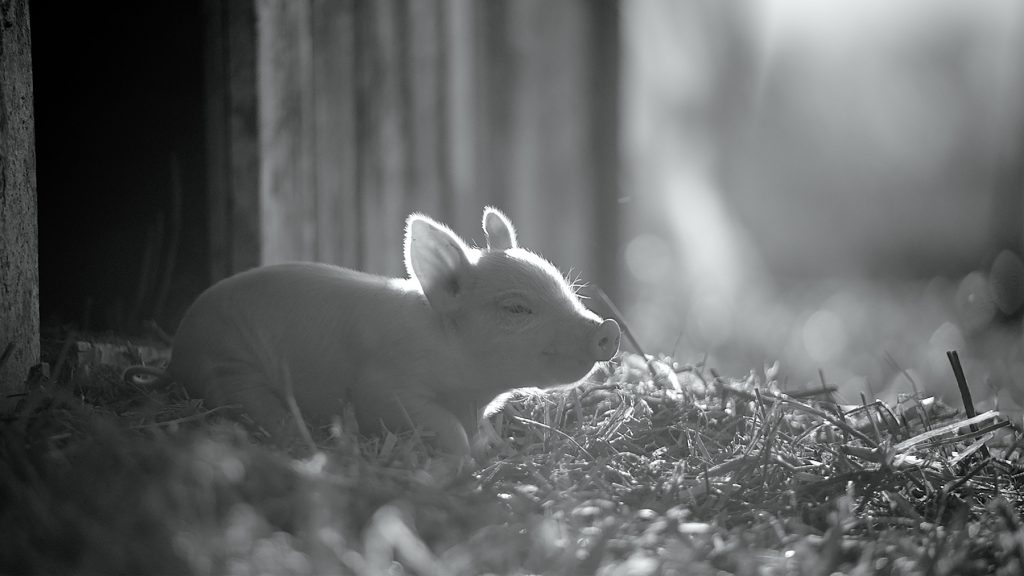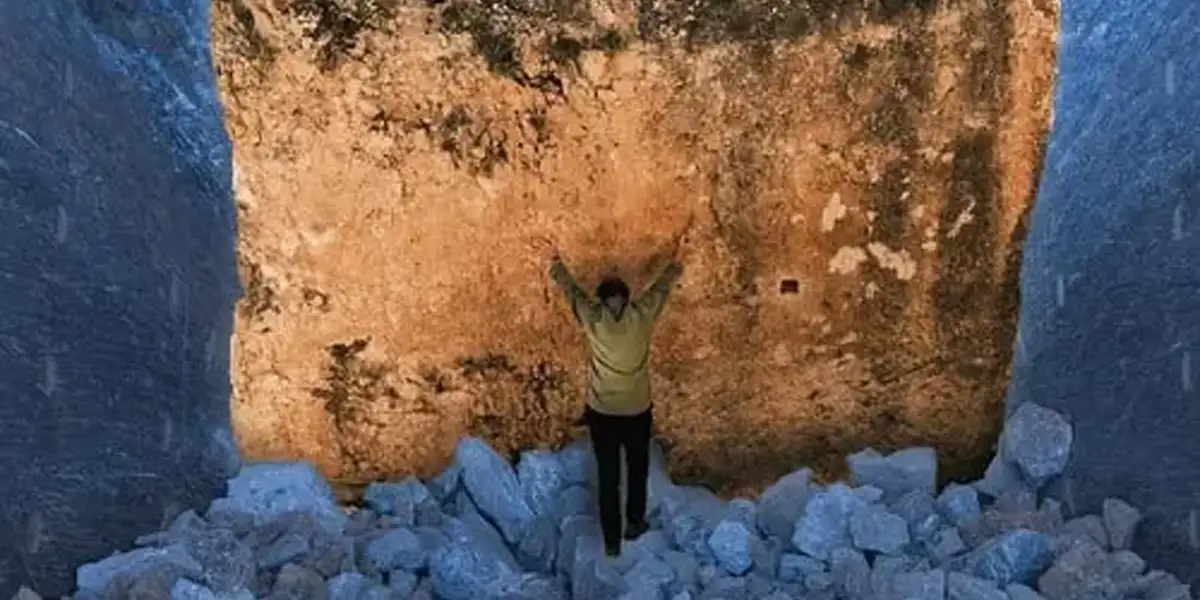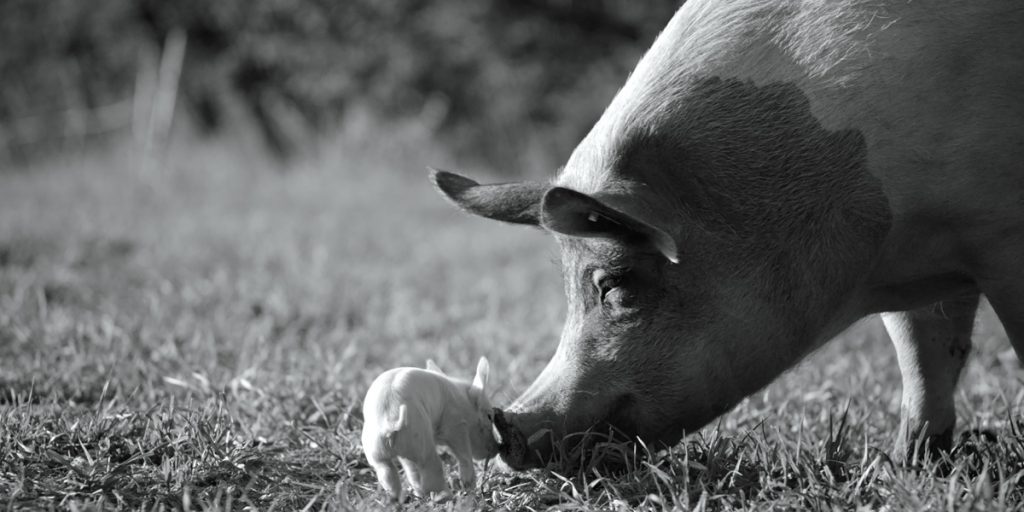Startling in its intimacy and measured in its pacing, Gunda is a one-of-a-kind nature documentary which serves as an abrupt but much-needed wake-up call to humanity.
On the surface, Victor Kossakovsky’s minimalist documentary, Gunda, starts off simply and continues that way for its 93-minute runtime. It follows the daily life of the titular Gunda, a sow, who the viewer witnesses giving birth to around 10 piglets in a strikingly personal opening scene. From here we see the piglets grow under the watchful eye of their mother with scenes of chickens and cows interspersed for variety. But as simple as it may sound, Gunda is also deeply powerful. It is a documentary which will only resonate more and more over the days and weeks after being viewed. Gunda might first and foremost be about pigs but it speaks volumes for all animals, their undoubted sentience and need for respect from humans. Even the most ardent meat-eater would be hard pressed to turn a blind eye to this moving documentary.
Shot in beautiful black and white by Kossakovsky (who has directing, writing, cinematography and editing credits for the film) and his co-cinematographer, Gunda captures the animals and the landscape that surrounds them in breathtaking fashion. The decision to move away from colour gives Gunda a magical, timeless quality. Leaves licked by sunlight, grass swaying in the breeze, the sprouting, wispy hairs on the piglets’ days-old bodies, a silhouetted Gunda resting in her pen; all of it is captured in exquisite detail and is further enhanced by impressive sound design, which values ambient sounds of nature over more conventional documentary standards like voiceovers or music. Adding anything like this would have been detrimental and would have detracted from what Gunda is ultimately about: a pig, her offspring and their personal experiences. Cars and planes are sometimes heard too, a reminder of humanity’s great weight on other beings.
It is also notable that the most human involvement in the documentary (a farmyard vehicle seen only by its trailer and wheels) is one of destruction. The camera is often static but also moves with a measured, gracious speed at times, floating around the interior of the pig pen or low across a muddy field, ensuring the images remain captivating and alive. It also does not hold back in its close proximity to the animals; snouts are a common sight sniffing into the camera and even in the most intimate moments of birth and feeding the camera remains in place as a respectful observer.

Miniscule at birth but growing quickly, the piglets are perhaps the stars of the show. Their initial timidness in a new world gradually shifts to an embracing of adventure and before long they are playing in mud, running over one another and catching rain in their mouths. There are countless moments of joy between the piglets and their bond with each other and with their mother is unbreakable. Simply put, the piglets are cute. Watching kittens or puppies in a feature length film would be enjoyable and piglets are evidently no different. The additional shots of chickens and a herd of cows provide variety and remind the audience that the messages of the documentary apply not only to Gunda, but to animals worldwide.
Perhaps most surprisingly, Gunda has much in common with pieces of classic, fictional cinema. Robert Bresson’s Au Hasard Balthazar (1966), a landmark drama in French cinema which follows a donkey and its passing from owner to owner, is similarly shot in black and white and draws the soul of an animal into view. Bresson focusses heavily on Balthazar’s eyes in various close-ups and in Gunda, the titular pig and the cows all occasionally look directly into the camera and with that into the eyes of the audience. All of these moments are as powerful as any human actor looking into the screen from any film.
The films of Béla Tarr (Sátántangó, Werckmeister Harmonies), a Hungarian director known for his long takes and a great proponent of ‘slow cinema’, also clearly influence Gunda. Kossakovsky’s documentary certainly tests your patience on numerous occasions, like a lot of Tarr’s work does. The laid-back pacing does feel too slow at some points but for the most part it gives the documentary a true to life tone. Follow any human around for several days and their lives would be just as, well, slow as Gunda’s. That is life, and pigs are no different. Gunda may be too minimalist for some but there is a great respect to be had for its straight-up presentation of existence. There is also a strong pessimism to Tarr’s work which is seen less in Gunda but is no doubt still there, particularly towards the inevitable ending. Kossakovsky masterfully balances the joys of Gunda and her piglets with the heartbreak and cruelty which humans impose on such animals.
The greatest strength of Gunda is that it does what all the best documentaries do: it never preaches but merely observes, allowing the subjects to portray its central messages without ever forcing them down the throat of the viewer. Kossakovsky recognises that people essentially do not like being preached to, even with undeniably powerful messages. The themes of veganism, nature and the sentience of animals are all potent but will undoubtedly resonate with a wider audience through this observational, cinema verité style. When the credits roll with only ambient sounds of nature playing, the emotional and raw power of Gunda is great and over time it will only grow as a passionate call to the world’s population to change.
Gunda had its UK Premiere at the Glasgow Film Festival on 7th March, 2021 and is now available to watch on digital and on demand.

 loudandclearreviews.com
loudandclearreviews.com
